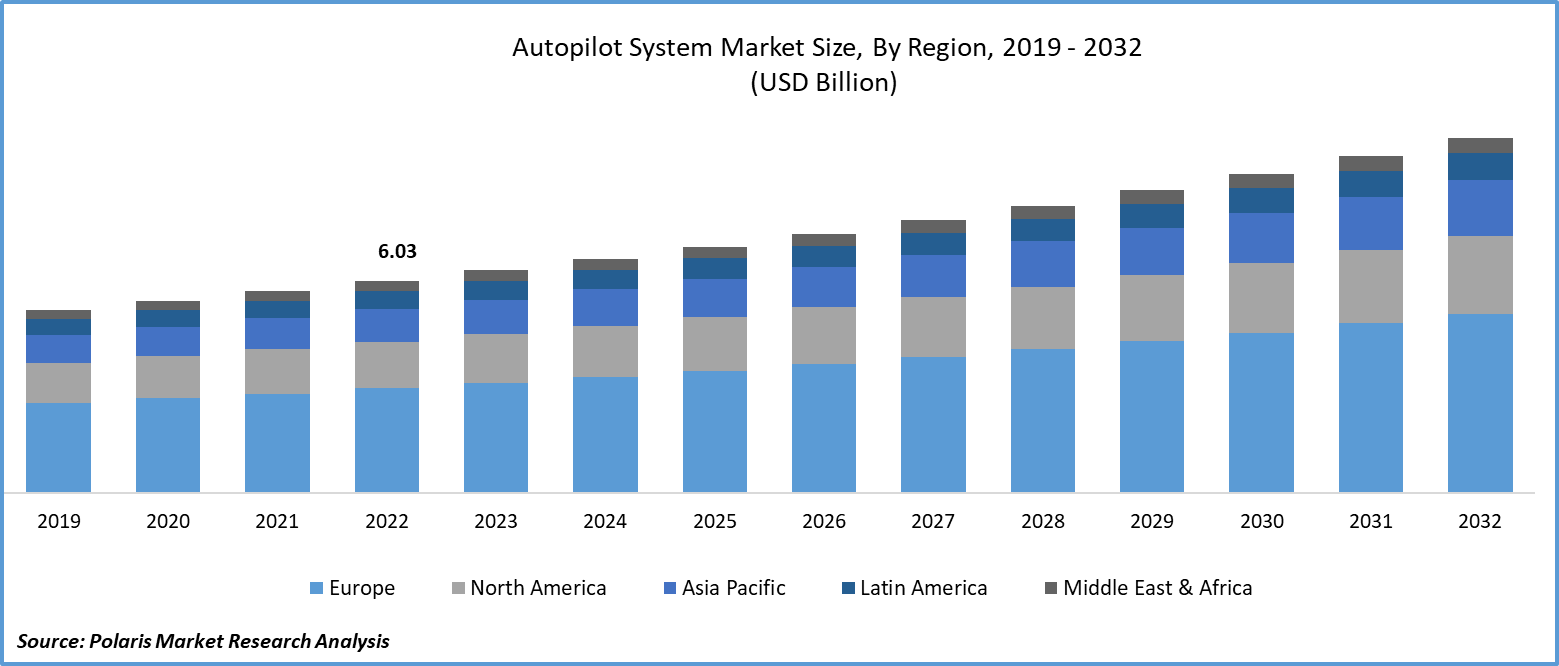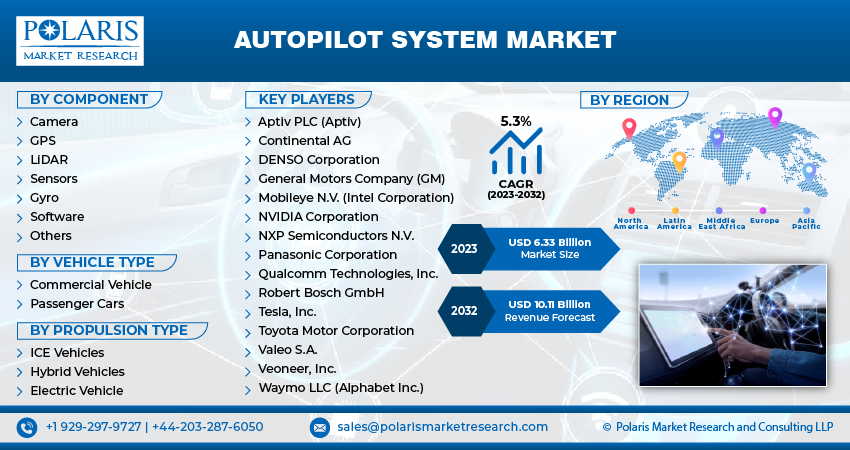
Autopilot System Market Share, Size, Trends, Industry Analysis Report
By Component (Camera, GPS, LiDAR, Sensors, Gyro, Software, Others); By Vehicle Type; By Propulsion Type; By Region; Segment Forecast, 2023- 2032
- Published Date:Nov-2023
- Pages: 116
- Format: PDF
- Report ID: PM3998
- Base Year: 2022
- Historical Data: 2019-2021
Report Outlook
The global autopilot system market was valued at USD 6.03 billion in 2022 and is expected to grow at a CAGR of 5.3% during the forecast period.
Autopilot technology in the automotive sector represents a significant advancement towards the future of transportation. These state-of-the-art systems, known as Advanced Driver-Assistance Systems (ADAS), combine a range of sensors, cameras, LiDAR, and powerful software algorithms to enable vehicles to operate in a semi-autonomous mode, with the ultimate goal of achieving full autonomy.
The market research report offers an in-depth analysis of the industry to support informed decision-making. It offers a meticulous breakdown of various market niches and keeps readers updated on the latest industry developments. Along with tracking the autopilot system market on the basis of SWOT and Porter’s Five Forces models, the research report includes graphs, tables, charts, and other pictorial representations to help readers understand the key insights and important data easily.

To Understand More About this Research: Request a Free Sample Report
One of the key benefits of autopilot systems is the significant improvement in road safety. They incorporate features such as adaptive cruise control, which expertly maintains a safe following distance, and lane-keeping assist, which ensures precise alignment within the designated lane. By providing timely assistance to drivers in making quick decisions, these technologies serve as a strong deterrent against accidents caused by human error. This results in a safer and more secure driving experience for all road users.
For instance, in May 2023, Porsche announced a new partnership with Mobileye, a former collaborator of Tesla, to develop high-end Advanced Driver Assistance Systems (ADAS) for their upcoming models.
The deployment of autopilot systems is faced with several critical challenges. These include evolving regulatory frameworks and certification processes for autonomous technology, which create a complex landscape for compliance. Ensuring robust cybersecurity is also imperative to safeguard against potential cyber threats. Striking a balance between machine-driven decisions and human intervention in critical situations poses a significant challenge. Additionally, weather conditions and varying environments can challenge sensor accuracy. Lastly, educating and acclimating the public to trust and adapt to autonomous systems presents a considerable hurdle in the widespread adoption of autopilot technology.

For Specific Research Requirements: Request for Customized Report
Growth Drivers
Increased Safety and Efficient Mobility
The surging demand for autopilot systems is driven by a combination of critical factors that include the paramount need for heightened safety on roads. Autopilot technology significantly reduces the risk of accidents resulting from human error, which is one of the primary causes of road mishaps. Features like adaptive cruise control and lane-keeping assist act as electronic co-pilots, ensuring that drivers remain alert and safe.
In addition, the appeal of enhanced convenience is a pivotal factor. Autopilot systems mitigate the cognitive load on drivers during long journeys, making travel more comfortable and less demanding. This contributes to a more enjoyable and relaxed driving experience.
Furthermore, the trajectory towards fully autonomous vehicles is a significant impetus. Autopilot technology is essential in achieving progressively higher levels of automation, holding the promise of a future where vehicles navigate seamlessly, enhancing overall road safety and efficiency. With technological advancements and growing public acceptance, the widespread adoption of autopilot systems is poised to revolutionize the transportation landscape.
Report Segmentation
The market is primarily segmented based on component, vehicle type, propulsion type, and region.
|
By Component |
By Vehicle Type |
By Propulsion Type |
By Region |
|
|
|
|
To Understand the Scope of this Report: Speak to Analyst
By Type Analysis
Camera Segment is Expected to Witness Highest Growth During Forecast Period
The camera segment in the autopilot system market is expected to grow at the highest CAGR over the projected period. It is a crucial component that drives advancements in autonomous technology. Equipped with cutting-edge sensors and image processing capabilities, these sophisticated cameras enable vehicles to perceive and interpret their surroundings. They play a pivotal role in identifying objects, lane markings, traffic signals, pedestrians, and other vehicles, thereby providing critical data for decision-making algorithms.
Camera-based systems are particularly adept at recognizing visual cues, making them indispensable in scenarios with complex and dynamic environments. They complement other sensor technologies like LiDAR and radar, offering a comprehensive perception suite.
As the demand for autonomous driving capabilities continues to grow, the camera segment is expected to witness substantial innovation and market expansion, further solidifying its role in shaping the future of transportation.
By Vehicle Type Analysis
Passenger Cars Segment Accounted for the Largest Market share in 2022
The passenger cars segment had the largest market share in 2022 and is projected to maintain its position throughout the forecast period. Consumers are increasingly prioritizing safety and convenience features in their vehicles, leading to a high demand for advanced driver-assistance systems (ADAS) such as autopilot technology. Major automakers are rapidly integrating these systems into their models to meet the demand. Features like adaptive cruise control, lane-keeping assist, and automated parking are improving the driving experience, which is attracting more consumers to choose vehicles equipped with these technologies. Furthermore, ongoing research and development in autonomous driving are driving the growth of autopilot systems in passenger cars, indicating a future of enhanced road safety and efficient transportation.
By Propulsion Type Analysis
ICE Vehicles Segment Held the Significant Market Revenue share in 2022
The ICE vehicles segment in the autopilot system market is witnessing a significant shift towards advanced driver-assistance systems. While electric vehicles (EVs) often take the forefront in discussions about autopilot technology, ICE vehicles are also experiencing growth in this sector. Automakers are increasingly incorporating autopilot features into ICE cars to meet rising consumer demand for enhanced safety and convenience. Features like adaptive cruise control, lane-keeping assist, and automated parking are being integrated, making ICE vehicles equipped with these technologies more attractive to consumers. The growth of autopilot systems in ICE vehicles represents a broader industry-wide move towards safer and more advanced transportation.
Regional Insights
Europe Region Dominated the Global Market in 2022
The European region held the largest market share in 2022 and is expected to maintain its dominance over the forecasted period. The autopilot system market in Europe is growing rapidly, with significant advancements in technology. European countries are actively adopting autonomous driving technology, mainly to enhance road safety and reduce emissions. This drive for innovation is not only fueled by major automotive manufacturers but also by pioneering startups, further propelling the development of autopilot systems.
Consumer demand for advanced driver-assistance systems (ADAS) is a crucial factor in this region. European consumers value safety features, which has led automakers to integrate autopilot technologies into their vehicle offerings seamlessly.
The Asia-Pacific region is projected to be the fastest-growing region during the forecasted period. Prominent automotive manufacturers, technology firms, and startups within the region are investing heavily in research and development to drive the advancement of autopilot systems. Governments in the Asia-Pacific region are actively endorsing the progress of autonomous technology by setting up extensive regulatory frameworks and policies. Notably, nations like China have set ambitious targets for the widespread adoption of autonomous vehicles, creating an environment conducive to the expansion of autopilot systems. Autopilot systems can be applied to various sectors such as commercial vehicles, agriculture, and aviation, which further broadens the market potential for the technology throughout the Asia-Pacific region.
Key Market Players & Competitive Insights
The autopilot system market is fragmented and is anticipated to witness competition due to several players' presence. Major service providers in the market are constantly upgrading their technologies to stay ahead of the competition and to ensure efficiency, integrity, and safety. These players focus on partnership, product upgrades, and collaboration to gain a competitive edge over their peers and capture a significant market share.
Some of the major players operating in the global market include:
- Aptiv PLC (Aptiv)
- Continental AG
- DENSO Corporation
- General Motors Company (GM)
- Mobileye N.V. (Intel Corporation)
- NVIDIA Corporation
- NXP Semiconductors N.V.
- Panasonic Corporation
- Qualcomm Technologies, Inc.
- Robert Bosch GmbH
- Tesla, Inc.
- Toyota Motor Corporation
- Valeo S.A.
- Veoneer, Inc.
- Waymo LLC (Alphabet Inc.)
Recent Developments
- In January 2023, Waymo inaugurated its completely autonomous ride-hailing service in Los Angeles, marking a significant expansion beyond its original operations in Phoenix, Arizona. This move is poised to hasten the acceptance and integration of autonomous vehicles for commercial purposes.
- In May 2022, Qualcomm unveiled a pivotal partnership with Volkswagen to incorporate the Snapdragon Ride Advanced Driver Assistance Systems (ADAS) and autonomous driving platforms into VW, Audi, and Porsche vehicle models. The objective was to expedite the commercialization of automated driving technology.
Autopilot System Market Report Scope
|
Report Attributes |
Details |
|
Market size value in 2023 |
USD 6.33 billion |
|
Revenue forecast in 2032 |
USD 10.11 billion |
|
CAGR |
5.3% from 2023 – 2032 |
|
Base year |
2022 |
|
Historical data |
2019 – 2021 |
|
Forecast period |
2023 – 2032 |
|
Quantitative units |
Revenue in USD billion and CAGR from 2023 to 2032 |
|
Segments covered |
By Component, By Vehicle Type, By Propulsion Type, By Region |
|
Regional scope |
North America, Europe, Asia Pacific, Latin America, Middle East & Africa |
|
Customization |
Report customization as per your requirements with respect to countries, region, and segmentation. |
We provide our clients the option to personalize the autopilot system market report to suit their needs. By customizing the report, you can get data as per your format and definition. Also, the customization option allows you to gain a deeper dive into a specific segment, region, customer, or market competitor.
